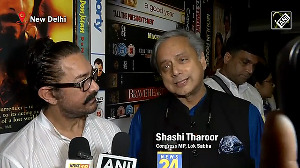Multinational pharmaceutical companies have put on hold plans to introduce their patented drugs in India, waiting for clarity on regulatory issues such as data protection, pre-grant opposition and patenting of derivatives.
While India moved to a product patent regime from January 1 this year, companies such as Eli Lilly, Novartis, Pfizer and Merck Sharpe & Dohme are treading with caution. They are introducing a few of their patented drugs but keeping the rest of their sizeable basket safely away from India's shores.
"There are certain deficiencies in the Indian patent law that need to be plugged to make its IPR (intellectual property rights) regime world class. Right now, companies are waiting and watching as to how their areas of concern get addressed," said Ranjit Shahni, who heads the multinational lobby, Organisation of Pharmaceutical Producers of India.
MSD, the Indian subsidiary of Merck, is only a marketing channel as of now. "We fully intend to bring patented products into the country but we are in no hurry. True, the patent law is not perfect but we expect it to be sorted out," said managing director Leonard Tauro.
He added that the regulatory issues were only one of the many factors why Merck, for the time being, was not looking to set up manufacturing operations here.
Eli Lilly has expressed its intention to keep its patented drugs on hold until clarity emerges. Its chairman and CEO Sidney Taurel has said that patent protection in India is inadequate.
Therefore, only drugs with in-built protection are being brought in. These, according to a company spokesperson, are drugs either difficult to manufacture on account of technological barriers or distinctly specialised. "We are not launching another drug for the next 12 months," he added.
Neither Pfizer nor GlaxoSmithKline has a single patented drug in the country right now. "The protection in India does not ensure that the molecule won't be copied. If that happens, the price slips to the lowest common denominator," said S Ramkrishna, director - corporate affairs, Pfizer India.
The areas of concern are many. The definition of patentability has been narrowed down to only new chemical entities, keeping out the derivatives, even as the scope of compulsory licensing has been broadened.
Compulsory licensing circumvents a patent and grants right to manufacture to another company, in case of national emergency.
In India, some industry players feel that it is too open-ended and can be extended to cardio-vascular and central nervous systems' drugs and that there is no assurance of a rollback once the contingency is over. Besides, there is the hurdle of pre-grant opposition and imported drugs being outside the patent cover.
"India is the only country with both pre- and post-grant opposition. In the coming months, one can expect a lot of pre-grant oppositions from the Indian companies and lots of infringement litigation from the MNCs," said patent attorney H Subramanium.
A lot of cases are expected to land up at the World Trade Organisation, especially the ones pertaining to 'reasonable royalty'. This is what generic manufacturers would have to pay the innovator companies based on the mailbox applications between 1995 and 2005.
However, curiously, the MNCs are non-committal when asked how many patented drugs they would bring into India if the loopholes were plugged. "It's a question of the pipeline. Whatever gets global approval, would eventually be brought to India," said the executive of one.
Playing it safe
-
Some loopholes in the Indian patent law need to be plugged to make its IPR regime world-class
- Eli Lilly, Novartis, Pfizer and Merck Sharpe & Dohme are applying caution in launching drugs in India
- MNCs are non-committal on how many patented drugs they will bring in even if the loopholes are plugged






